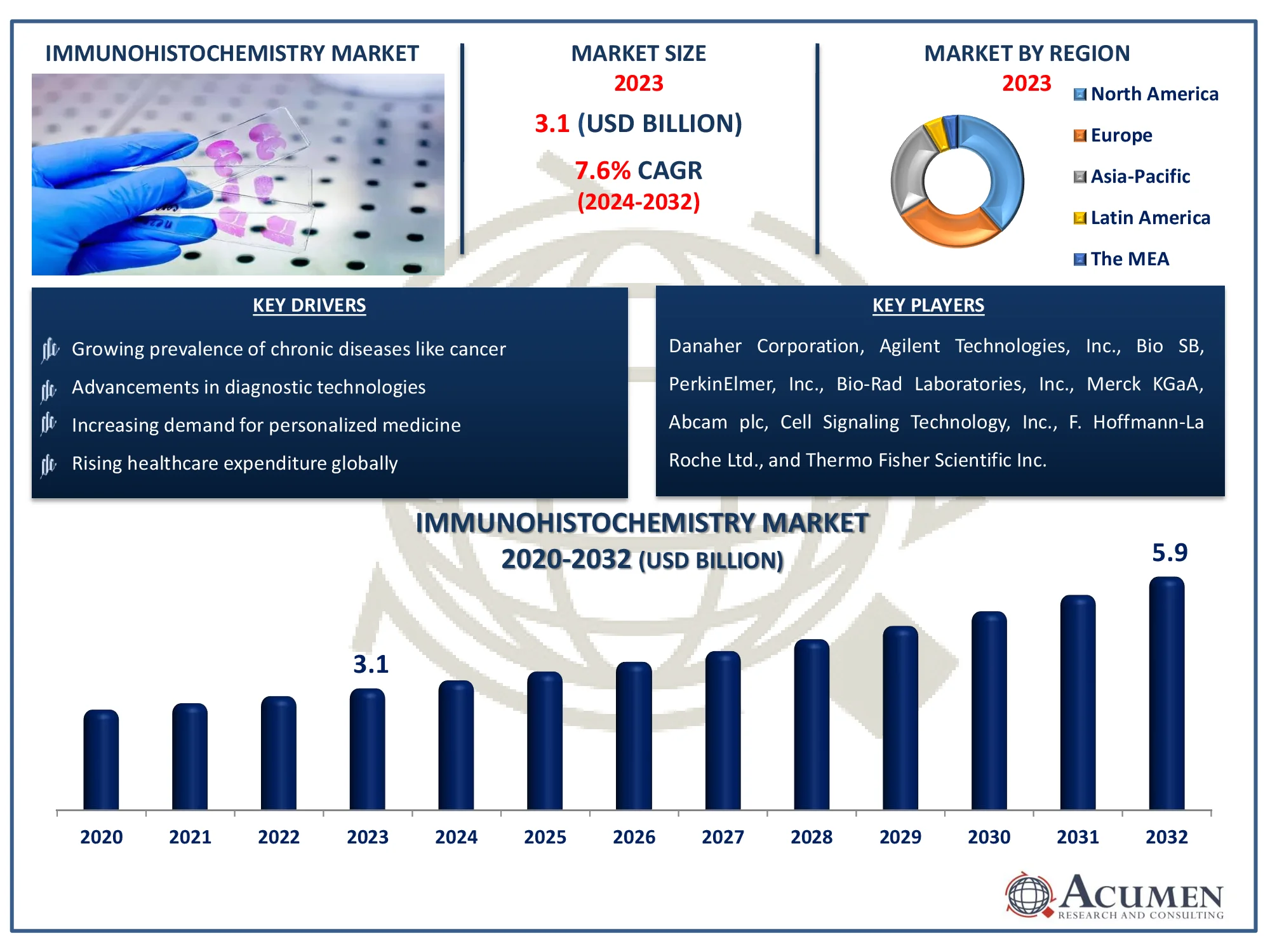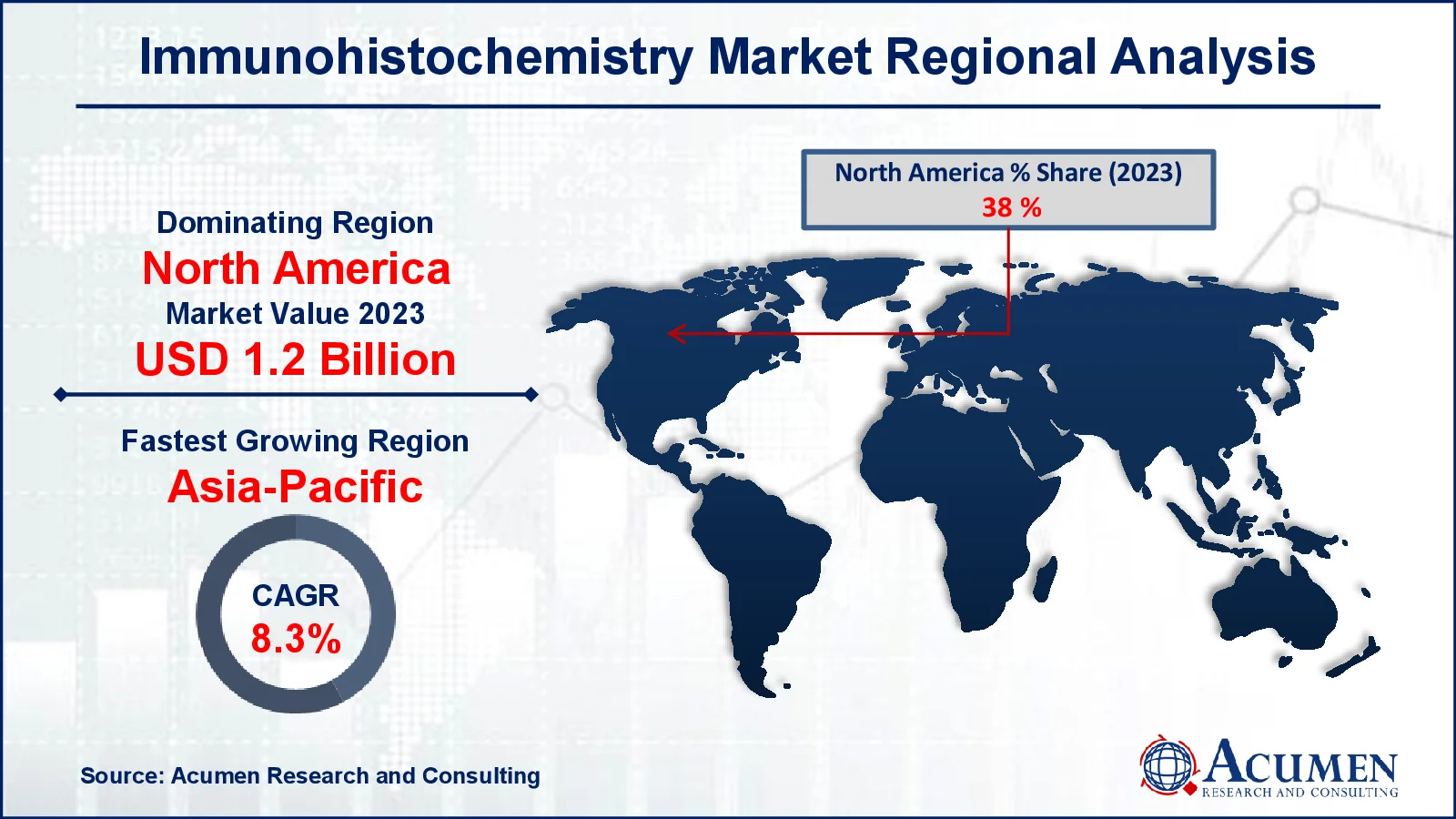Immunohistochemistry Market Size - Global Industry, Share, Analysis, Trends and Forecast 2024 - 2032
Published :
Report ID:
Pages :
Format :
Immunohistochemistry Market Size - Global Industry, Share, Analysis, Trends and Forecast 2024 - 2032
Report Coverage
- Industry Dynamics
- Market Size and Forecast Data
- Segment Analysis
- Competitive Landscape
- Regional Analysis with a Niche Focus on Country-Level Data
- High Level Analysis - Porter's, PESTEL, Value Chain, etc.
- Company Profiles of Key Players
- Option to Customize the Report As Per Your Specific Need
Request Sample Report
The Global Immunohistochemistry Market Size accounted for USD 3.1 Billion in 2023 and is estimated to achieve a market size of USD 5.9 Billion by 2032 growing at a CAGR of 7.6% from 2024 to 2032.
Immunohistochemistry Market Highlights
- Global immunohistochemistry market revenue is poised to garner USD 5.9 billion by 2032 with a CAGR of 7.6% from 2024 to 2032
- North America immunohistochemistry market value occupied around USD 1.2 billion in 2023
- Asia-Pacific immunohistochemistry market growth will record a CAGR of more than 8.3% from 2024 to 2032
- Among application, the diagnostics sub-segment generated more than USD 2.1 billion revenue in 2023
- Based on end-use, the hospitals and diagnostic Laboratories sub-segment generated around 71% immunohistochemistry market share in 2023
- Growing research activities in immuno-oncology is a popular immunohistochemistry market trend that fuels the industry demand

Immunohistochemistry (IHC) is a technique used in biology and medicine to identify and locate specific proteins within tissue slices. It combines immunological and histological methods to detect antigens by labeling antibodies with a visible marker, such as a dye or a fluorescent molecule. When these tagged antibodies bind to their target antigen, they emit a colorful or fluorescent signal that may be seen with a microscope. IHC is commonly used to diagnose diseases, such as cancer, by recognizing specific cellular markers that signal disease presence or type. It also supports research by exposing protein distribution and localization within tissues, allowing for better understanding of cellular processes and disease mechanisms.
Global Immunohistochemistry Market Dynamics
Market Drivers
- Growing prevalence of chronic diseases like cancer
- Advancements in diagnostic technologies
- Increasing demand for personalized medicine
- Rising healthcare expenditure globally
Market Restraints
- High costs of immunohistochemistry equipment
- Lack of skilled professionals in developing regions
- Stringent regulatory requirements
Market Opportunities
- Expansion in emerging markets
- Development of novel biomarkers
- Integration with digital pathology
Immunohistochemistry Market Report Coverage
| Market | Immunohistochemistry Market |
| Immunohistochemistry Market Size 2022 |
USD 3.1 Billion |
| Immunohistochemistry Market Forecast 2032 | USD 5.9 Billion |
| Immunohistochemistry Market CAGR During 2023 - 2032 | 7.6% |
| Immunohistochemistry Market Analysis Period | 2020 - 2032 |
| Immunohistochemistry Market Base Year |
2022 |
| Immunohistochemistry Market Forecast Data | 2023 - 2032 |
| Segments Covered | By Product, By Application, By End-Use, And By Geography |
| Regional Scope | North America, Europe, Asia Pacific, Latin America, and Middle East & Africa |
| Key Companies Profiled | Danaher Corporation, Agilent Technologies, Inc., Bio SB, PerkinElmer, Inc., Bio-Rad Laboratories, Inc., Merck KGaA, Abcam plc, Cell Signaling Technology, Inc., F. Hoffmann-La Roche Ltd., and Thermo Fisher Scientific Inc. |
| Report Coverage |
Market Trends, Drivers, Restraints, Competitive Analysis, Player Profiling, Covid-19 Analysis, Regulation Analysis |
Immunohistochemistry Market Insights
Immunohistochemistry (IHC) is a critical technique that uses monoclonal and polyclonal antibodies to detect and visualize antigen distribution in tissue samples. This approach is widely used in illness diagnosis, particularly cancer, because it detects the presence of tumor antigens, which aids in discriminating between benign and malignant tumors. The increased frequency of chronic diseases, combined with a rapidly aging population, are important drivers of the IHC market. Cancer incidence is increasing internationally, which is predicted to increase demand for effective diagnostic techniques such as IHC. This approach is important in illness diagnosis since it can predict tumor prognosis as well as identify enzymes, tumor suppressor genes, antigens, and tumor cell proliferation. Furthermore, IHC is useful in identifying specific cellular markers that can guide targeted therapy, making it a crucial tool in personalized medicine.
Antibody technology developments, which enable for more precise and reliable antigen detection, are also driving market expansion. Furthermore, the combination of IHC with digital pathology and image processing techniques improves diagnostic accuracy and efficiency. However, the market confronts constraints like as high IHC equipment prices and the demand for experienced personnel to interpret data. Nonetheless, there are potential for market expansion, especially in emerging nations with rapidly increasing healthcare infrastructure. The ongoing development of novel biomarkers, as well as the increased emphasis on immuno-oncology research, are projected to propel the immunohistochemistry market ahead.
Immunohistochemistry Market Segmentation
The worldwide market for immunohistochemistry is split based on product, application, end-use, and geography.
Immunohistochemistry Products
- Antibodies
- Primary Antibodies
- Secondary Antibodies
- Equipment
- Slide Staining Systems
- Tissue Microarrays
- Tissue Processing Systems
- Slide Scanners
- Others
- Reagents
- Histological Stains
- Blocking Sera and Reagents
- Chromogenic Substrates
- Fixation Reagents
- Stabilizers
- Organic Solvents
- Proteolytic Enzymes
- Diluents
- Kits
According to immunohistochemistry industry analysis, the antibodies section earns the most income due to their vital function in the diagnostic process. Antibodies, both monoclonal and polyclonal, are required to recognize specific antigens inside tissue samples, which is the foundation of immunohistochemistry. They enable the exact identification of proteins, enzymes, and other biological indicators, making them critical in illness diagnosis, particularly in cancer. The increased desire for personalized treatment and targeted therapy increases the need for particular antibodies. Furthermore, advances in antibody production technology have increased their specificity and reliability, resulting in widespread adoption. As a result, the antibodies sector remains the most profitable in the IHC market, owing to its critical role in diagnostic and research.
Immunohistochemistry Applications
- Diagnostics
- Cancer
- Infectious Diseases
- Cardiovascular Diseases
- Autoimmune Diseases
- Diabetes Mellitus
- Nephrological Diseases
- Drug Testing
The diagnostics segment dominates the immunohistochemistry (IHC) market, owing to its broad use in disease detection, notably cancer. IHC's capacity to detect the presence of specific antigens in tissue samples makes it an essential tool for diagnosing illnesses at the molecular level. This precision is crucial for distinguishing between different types of cancers and determining their stage, which has a direct impact on treatment options. The increased frequency of chronic diseases such as cancer, combined with the need for early and precise detection, drives the diagnostics segment. Furthermore, combining IHC with modern imaging techniques improves diagnosis accuracy, further establishing its market leadership.
Immunohistochemistry End-Uses
- Hospitals and Diagnostic Laboratories
- Research Institutes
- Others
Hospitals and diagnostic laboratories are the primary end-users in the immunohistochemistry market due to their critical role in frontline healthcare and diagnostics. These institutions rely on IHC to accurately identify a wide range of disorders, particularly cancer, where the identification of specific biomarkers is critical for determining optimal treatment regimens. The huge volume of patients treated in hospitals and labs necessitates the frequent use of IHC, which ensures quick and accurate diagnostic results. Furthermore, the increased emphasis on customized treatment has highlighted the significance of IHC in clinical decision-making in these settings. As a result of their essential role in patient care and diagnostic innovation, hospitals and diagnostic laboratories dominate the market.
Immunohistochemistry Market Regional Outlook
North America
- U.S.
- Canada
Europe
- U.K.
- Germany
- France
- Spain
- Rest of Europe
Asia-Pacific
- India
- Japan
- China
- Australia
- South Korea
- Rest of Asia-Pacific
Latin America
- Brazil
- Mexico
- Rest of Latin America
The Middle East & Africa
- South Africa
- GCC Countries
- Rest of the Middle East & Africa (ME&A)

Immunohistochemistry Market Regional Analysis
Asia-Pacific is evaluated to observe the quickest development over the immunohistochemistry market forecast period attributable to rising disposable income, high neglected clinical requirements of patients, rising mindfulness about early finding, and accessibility of successful treatment in rising nations, for example, India and China. Asia-Pacific is the most encouraging goal for market players because of expanding instances of different sorts of cancers growths in this region. North America was at the front line of the immunohistochemistry market, with an offer of about 38.0% in 2023. Governments in the particular region are empowering continuous research exercises on immunohistochemistry (IHC) by financing them.
Immunohistochemistry Market Players
Some of the top immunohistochemistry companies offered in our report include Danaher Corporation, Agilent Technologies, Inc., Bio SB, PerkinElmer, Inc., Bio-Rad Laboratories, Inc., Merck KGaA, Abcam plc, Cell Signaling Technology, Inc., F. Hoffmann-La Roche Ltd., and Thermo Fisher Scientific Inc.
Frequently Asked Questions
How big is the immunohistochemistry market?
The immunohistochemistry market size was valued at USD 3.1 billion in 2023.
What is the CAGR of the global immunohistochemistry market from 2024 to 2032?
The CAGR of immunohistochemistry is 7.6% during the analysis period of 2024 to 2032.
Which are the key players in the immunohistochemistry market?
The key players operating in the global market are including Danaher Corporation, Agilent Technologies, Inc., Bio SB, PerkinElmer, Inc., Bio-Rad Laboratories, Inc., Merck KGaA, Abcam plc, Cell Signaling Technology, Inc., F. Hoffmann-La Roche Ltd., and Thermo Fisher Scientific Inc.
Which region dominated the global immunohistochemistry market share?
North America held the dominating position in immunohistochemistry industry during the analysis period of 2024 to 2032.
Which region registered fastest CAGR from 2024 to 2032?
Asia-Pacific region exhibited fastest growing CAGR for market of immunohistochemistry during the analysis period of 2024 to 2032.
What are the current trends and dynamics in the global immunohistochemistry industry?
The current trends and dynamics in the immunohistochemistry industry include growing prevalence of chronic diseases like cancer, advancements in diagnostic technologies, increasing demand for personalized medicine, and rising healthcare expenditure globally.
Which product held the maximum share in 2023?
The antibodies product held the maximum share of the immunohistochemistry industry.



